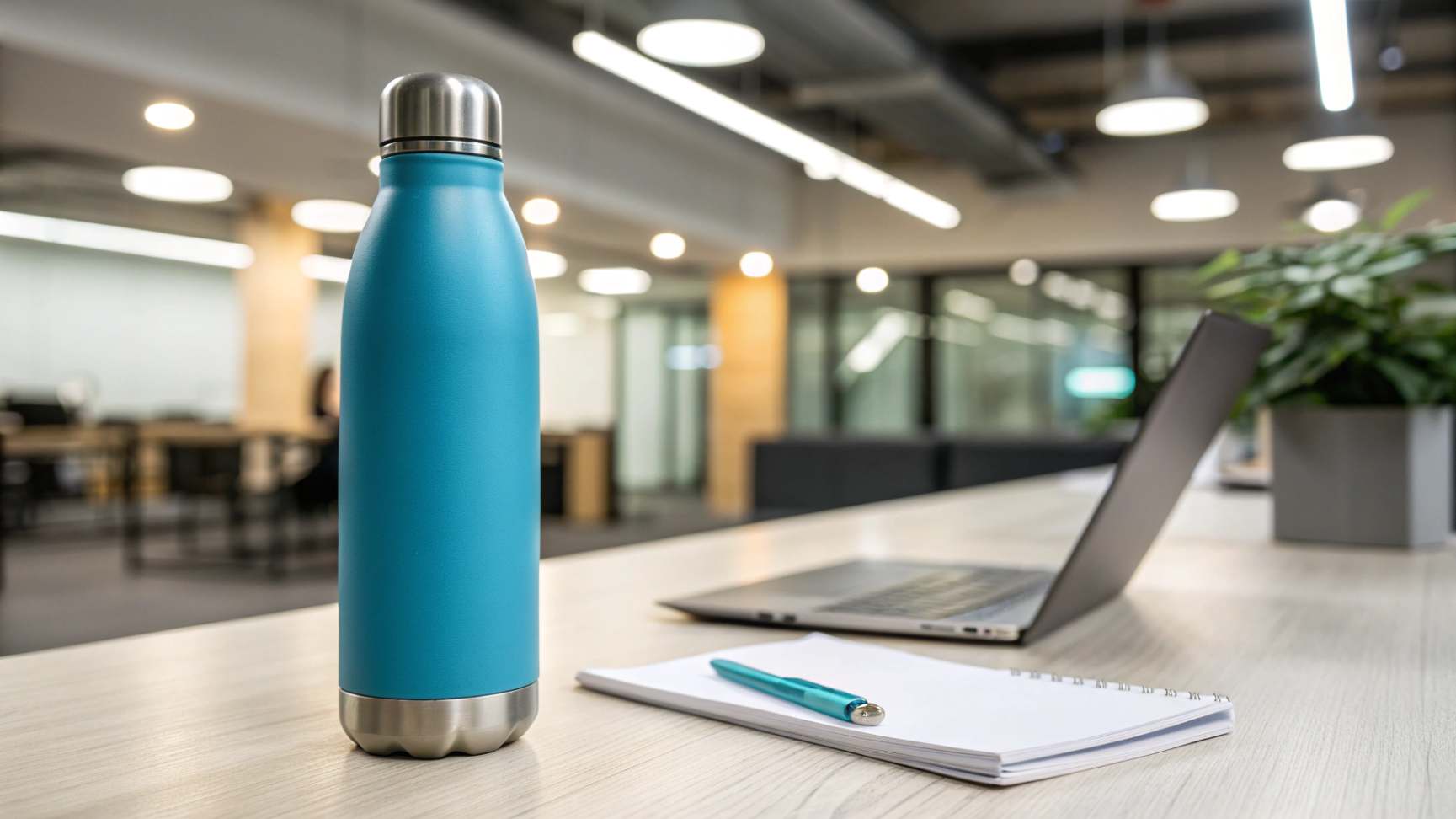
Ceramic-coated stainless steel water bottles offer three key B2B advantages: they eliminate metallic taste transfer for a premium drinking experience, position your brand as innovative and quality-focused, and maintain a pristine appearance longer through superior stain resistance and hygiene.
As someone who has worked with countless corporate clients at Cupique, I have seen firsthand how the right promotional prod uct can transform brand perception. The difference between a forgotten giveaway and a cherished daily-use item often comes down to one simple factor: does it actually improve the user's experience?
Ceramic-coated water bottles provide a premium drinking experienceTrue
The section states that ceramic-coated stainless steel water bottles eliminate metallic taste transfer, offering a premium drinking experience.
Ceramic-coated water bottles are more affordable than other promotional productsFalse
The section does not mention anything about the cost or affordability of ceramic-coated water bottles compared to other promotional products.
Why are reusable water bottles a strategic choice for B2B marketing
The promotional gifts industry faces a brutal reality. Most branded items end up in junk drawers within weeks of receiving them.
Reusable water bottles break this pattern because they solve a daily need while providing consistent brand exposure. Quality bottles become essential daily companions, ensuring your brand stays visible throughout the workday.
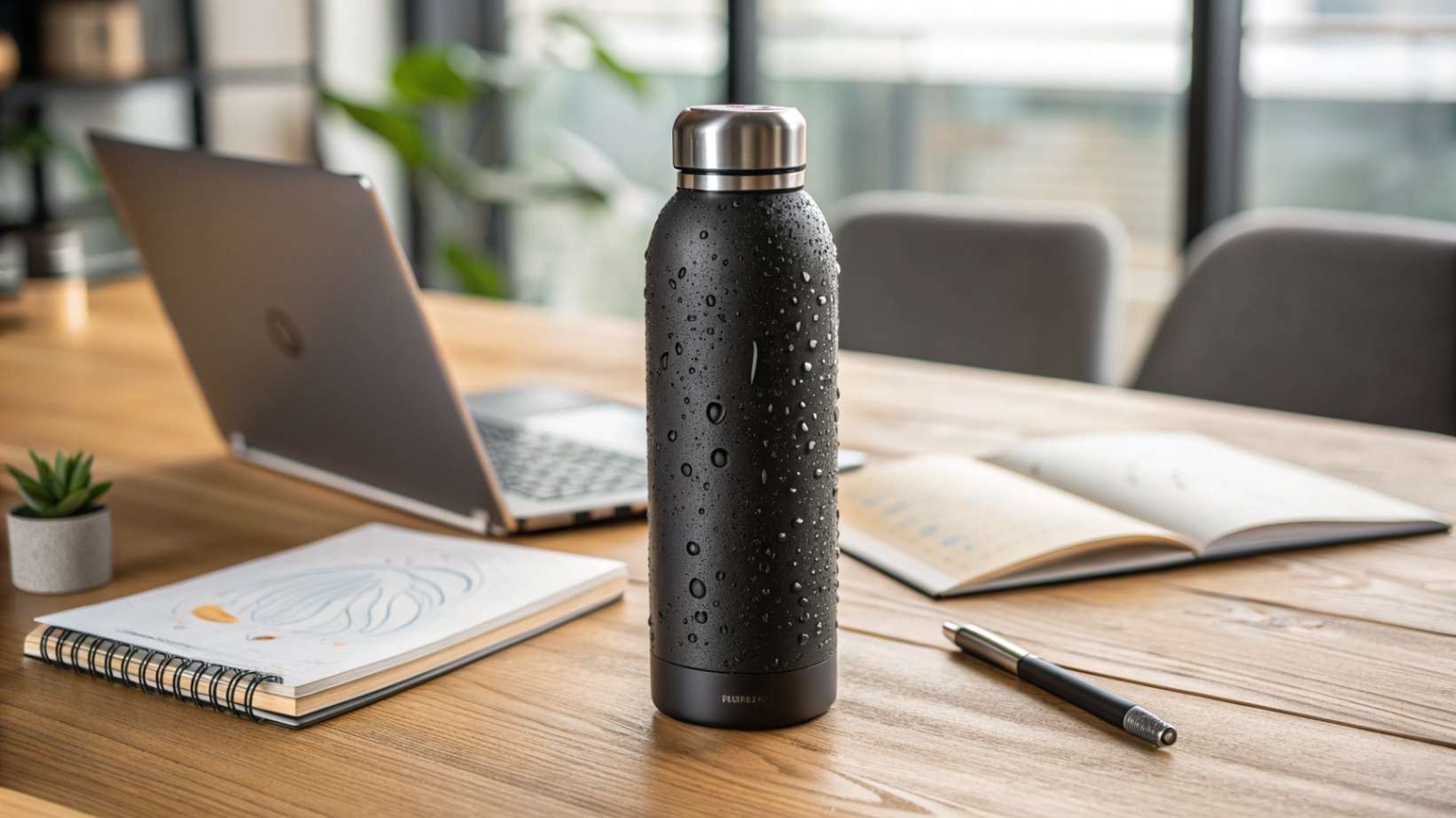
The strategic power of water bottles lies in their integration into daily routines. Unlike desk accessories that sit idle or clothing that gets worn occasionally, a quality water bottle travels with your recipient. It sits on their desk during meetings, accompanies them to the gym, and becomes part of their health-conscious lifestyle.
Daily Brand Touchpoints
Consider the typical corporate executive's day. They start with their morning coffee, attend back-to-back meetings, hit the gym after work, and unwind at home. A quality water bottle can be present for every single moment. This creates multiple brand impressions per day, not just the single moment of receiving the gift.
| Usage Scenario | Brand Exposure Duration | Visibility to Others |
|---|---|---|
| Office meetings | 2-3 hours daily | High (colleagues, clients) |
| Gym/fitness | 1-2 hours daily | Medium (fellow members) |
| Commuting | 1-2 hours daily | Low (personal use) |
| Home use | 2-4 hours daily | Medium (family, guests) |
Long-term ROI Calculation
When I work with corporate clients, I always emphasize the math behind promotional products. A ceramic-coated bottle that costs $4-8 wholesale can deliver brand impressions for 2-3 years. Compare this to a $500 digital ad campaign that might run for 30 days. The cost per impression becomes incredibly favorable for quality physical products.
The key is choosing products that recipients will actually use long-term. Standard plastic bottles often crack or develop odors within months. Basic stainless steel can leave metallic tastes that reduce daily usage. Ceramic-coated options solve these problems while maintaining professional appearance.
Reusable water bottles provide consistent brand exposureTrue
Reusable water bottles are used daily, keeping the brand visible throughout the workday.
Reusable water bottles are a poor choice for B2B marketingFalse
The snippet states that reusable water bottles break the pattern of promotional items ending up in junk drawers, making them a strategic choice for B2B marketing.
What are the key material differences when sourcing wholesale water bottles
Material choice determines everything from user experience to brand perception. The wrong material can undermine your entire promotional strategy.
The three main materials are plastic (lightweight but prone to odors), standard stainless steel (durable but can impart metallic taste), and ceramic-coated stainless steel (combining durability with taste neutrality and premium feel).
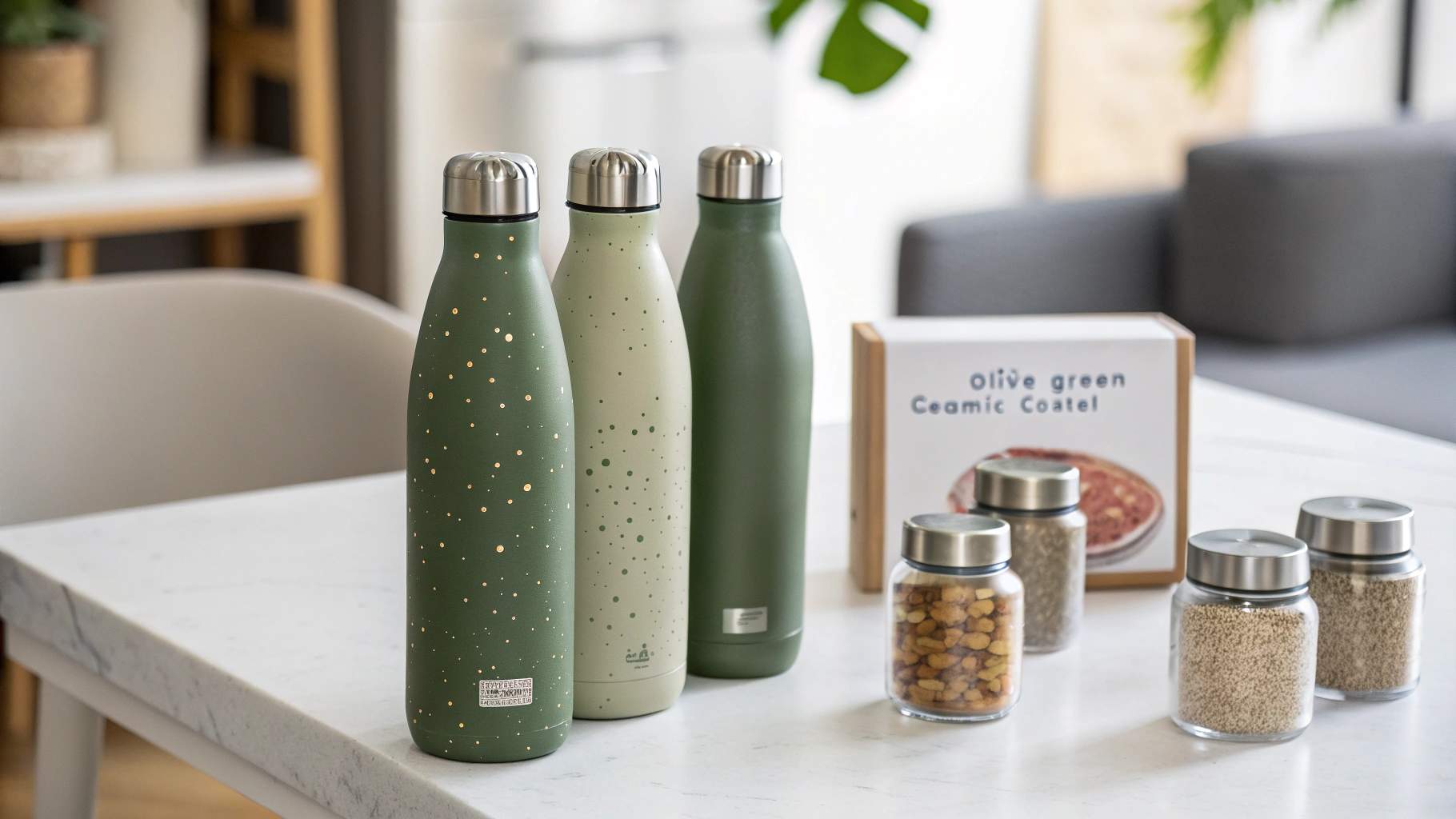
After producing over 3 million bottles at our facility, I have learned that material science directly impacts user satisfaction. The coating or liner material touches the beverage, which means it shapes every single drinking experience. This is where many promotional product buyers make costly mistakes.
Material Performance Comparison
Understanding the technical differences helps you make informed sourcing decisions. Each material category serves different market segments and price points.
| Material Type | Pros | Cons | Best Use Case |
|---|---|---|---|
| Plastic (BPA-free) | Lightweight, affordable, colorful | Retains odors, scratches easily, less premium feel | Budget campaigns, short-term promotions |
| Standard Stainless Steel | Durable, temperature retention, recyclable | Metallic taste, shows fingerprints, limited color options | Mid-range corporate gifts, sports teams |
| Ceramic-Coated Steel | Taste neutral, stain resistant, premium feel | Higher cost, requires careful handling | Executive gifts, premium brand positioning |
Manufacturing Quality Indicators
When sourcing wholesale bottles, the manufacturing details matter more than marketing claims. At Cupique, we focus on measurable quality indicators that directly impact user experience.
The wall thickness determines temperature retention performance. Double-wall construction with vacuum insulation should maintain hot beverages above 140°F for 6+ hours and cold beverages below 50°F for 12+ hours. Single-wall bottles, regardless of marketing claims, cannot achieve these results.
Seal quality determines whether the bottle will leak in briefcases or gym bags. Food-grade silicone seals with proper compression are essential. We test every design with pressure testing and drop tests before approving production runs.
Ceramic-coated stainless steel water bottles combine durability and taste neutralityTrue
The passage states that ceramic-coated stainless steel bottles have 'durability with taste neutrality'.
Plastic water bottles are the most durable material optionFalse
The passage states that plastic is 'lightweight but prone to odors', not that it is the most durable.
Are ceramic-lined stainless steel bottles a better option for corporate branding
The taste experience determines whether your branded bottle becomes a daily essential or a forgotten desk ornament. This single factor influences long-term brand exposure more than any other design element.
Ceramic-lined bottles eliminate metallic taste transfer while maintaining the durability and temperature retention of stainless steel. This creates a premium drinking experience that encourages daily use and positions your brand as quality-focused.
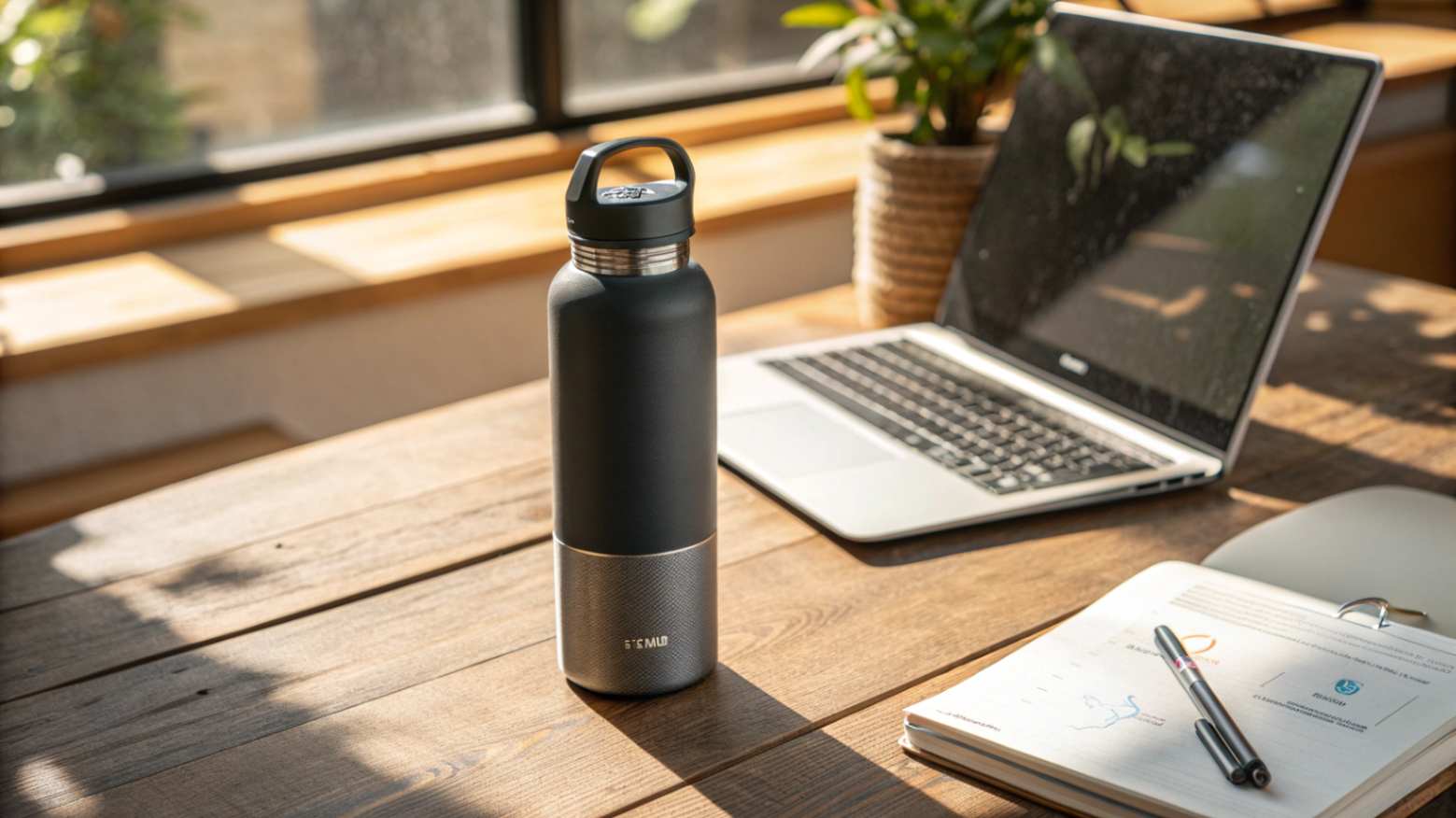
I learned this lesson the hard way during my early years in the industry. A major client ordered 5,000 standard stainless steel bottles for their annual conference. Six months later, their procurement manager called to complain that employees were not using the bottles because of the metallic taste. The investment in branding had been wasted because the user experience was poor.
The Science of Taste Transfer
Metallic taste occurs when beverages come into direct contact with stainless steel, especially with acidic drinks like coffee, tea, or citrus-infused water. The metal ions dissolve slightly into the liquid, creating an unpleasant aftertaste that many users find off-putting.
Ceramic coating creates a barrier between the beverage and metal surface. The ceramic material is chemically inert, meaning it does not react with beverages or impart any flavors. This allows the true taste of coffee, tea, or water to come through clearly.
Premium Positioning Strategy
Ceramic coating elevates your brand positioning beyond standard promotional products. When recipients experience the taste difference, they associate your brand with quality and attention to detail. This psychological association extends to their perception of your company's products or services.
| Feature | Standard Steel | Ceramic-Coated | Brand Impact |
|---|---|---|---|
| Taste neutrality | Poor (metallic) | Excellent | Associates brand with quality |
| Stain resistance | Moderate | Excellent | Maintains clean appearance |
| Cleaning ease | Difficult for coffee stains | Easy maintenance | Reduces user friction |
| Perceived value | Standard | Premium | Elevates brand positioning |
Cost-Benefit Analysis for Corporate Buyers
The price difference between standard and ceramic-coated bottles is typically $0.5 - 1 per unit wholesale. For a corporate order of 1,000 bottles, this represents an additional investment of $3,000-5,000. However, the improved user experience and brand positioning often justify this cost.
Consider the alternative: if only 30% of recipients regularly use standard bottles due to taste issues, your effective cost per active user doubles. Ceramic-coated bottles typically achieve 70-80% regular usage rates, making them more cost-effective for brand exposure.
Ceramic-lined stainless steel bottles provide a premium drinking experienceTrue
The passage states that ceramic-lined bottles eliminate metallic taste while retaining stainless steel durability, creating a premium experience.
Ceramic-lined bottles are more expensive than unlined stainless steelFalse
The passage does not mention the relative cost of ceramic-lined bottles compared to unlined stainless steel.
How can you effectively customize water bottles for promotional purposes
Customization transforms a functional product into a powerful brand ambassador. The right design approach ensures your bottle stands out while maintaining professional appeal.
Effective customization balances brand visibility with aesthetic appeal through strategic logo placement, color psychology, and functional design elements that enhance daily use rather than hinder it.
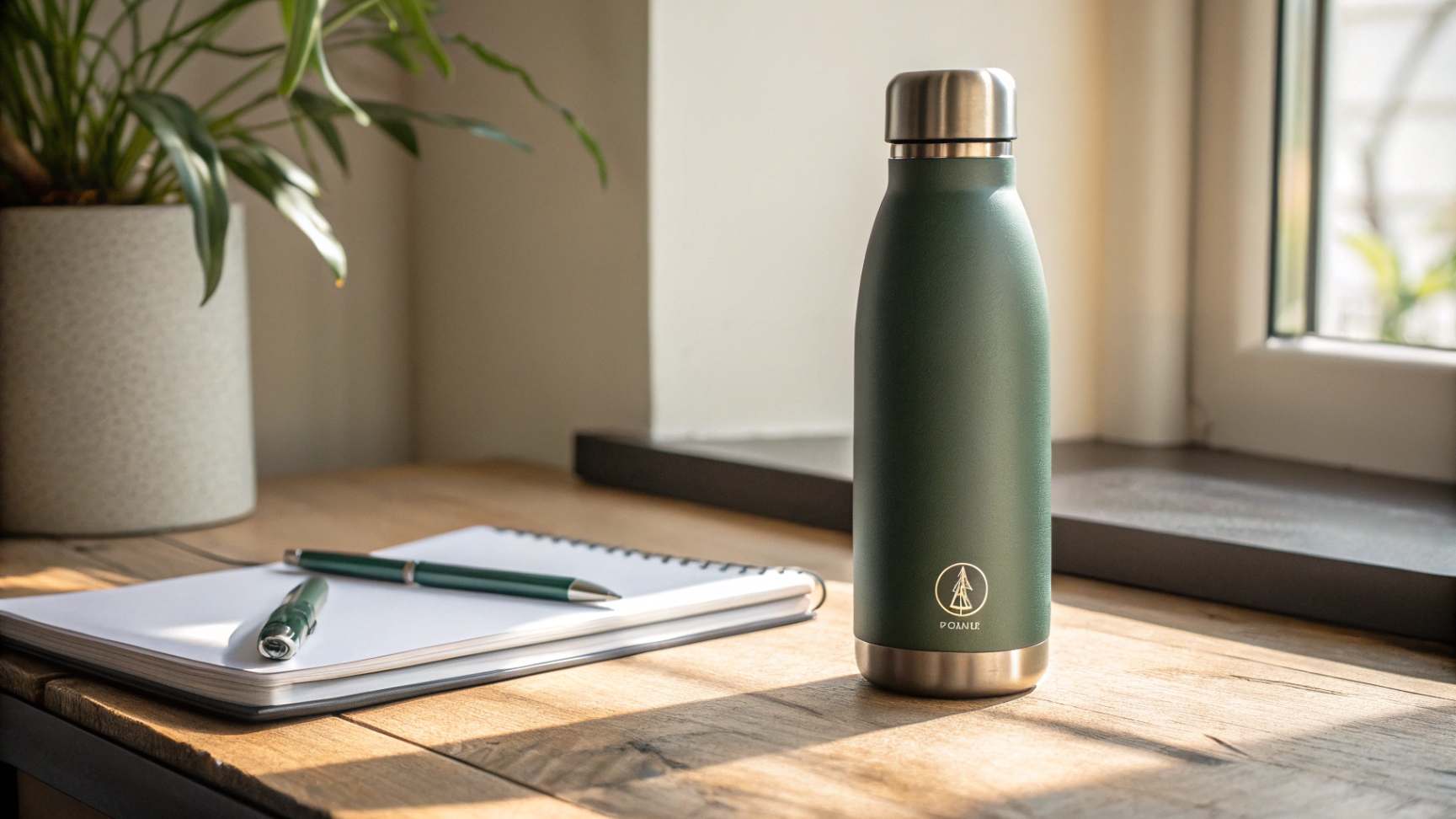
Over the years, I have seen countless customization approaches succeed and fail. The most effective strategies focus on integration rather than decoration. Your brand elements should feel like natural parts of the bottle design, not afterthoughts stuck onto a generic product.
Strategic Logo Placement
Logo placement determines both visibility and user acceptance. Prominent placement ensures brand recognition, but overwhelming branding can make recipients hesitant to use the bottle in professional settings.
The most effective approach uses multiple touchpoints with varying prominence levels. The primary logo goes on the main body for maximum visibility. Secondary branding elements like website URLs or taglines work well on the bottom or cap area.
Color Psychology in Corporate Branding
Color choice influences both brand recognition and user preference. Corporate colors should be incorporated thoughtfully rather than literally reproduced. A navy blue corporate brand might work better with a sophisticated charcoal bottle accented with navy elements.
| Color Category | Psychological Impact | Best Corporate Applications |
|---|---|---|
| Dark neutrals (black, charcoal, navy) | Professional, sophisticated | Executive gifts, B2B clients |
| Bright colors (red, orange, blue) | Energetic, approachable | Tech companies, creative agencies |
| Earth tones (green, brown, beige) | Natural, sustainable | Environmental firms, outdoor brands |
| Metallics (silver, gold, copper) | Premium, luxury | High-end services, luxury brands |
Functional Design Integration
The best customization enhances functionality rather than just adding visual elements. At Cupique, we often suggest integrated features that serve dual purposes as branding and utility elements.
Textured grip areas can incorporate subtle brand patterns while improving handling. Measurement markings can include company colors or motifs. Even the packaging design becomes part of the brand experience when done thoughtfully.
Effective customization balances brand visibility and aesthetic appeal.True
The passage states that effective customization balances brand visibility with aesthetic appeal.
Customization should prioritize brand visibility over aesthetic appeal.False
The passage indicates that effective customization balances both brand visibility and aesthetic appeal.
What should you look for in a reliable eco-friendly water bottle supplier
Supplier selection determines product quality, delivery reliability, and long-term brand reputation. The wrong choice can turn a successful promotional campaign into a customer service nightmare.
A reliable supplier should demonstrate manufacturing certifications, sustainable production practices, quality control systems, and clear communication throughout the sourcing process, with references from similar corporate clients.
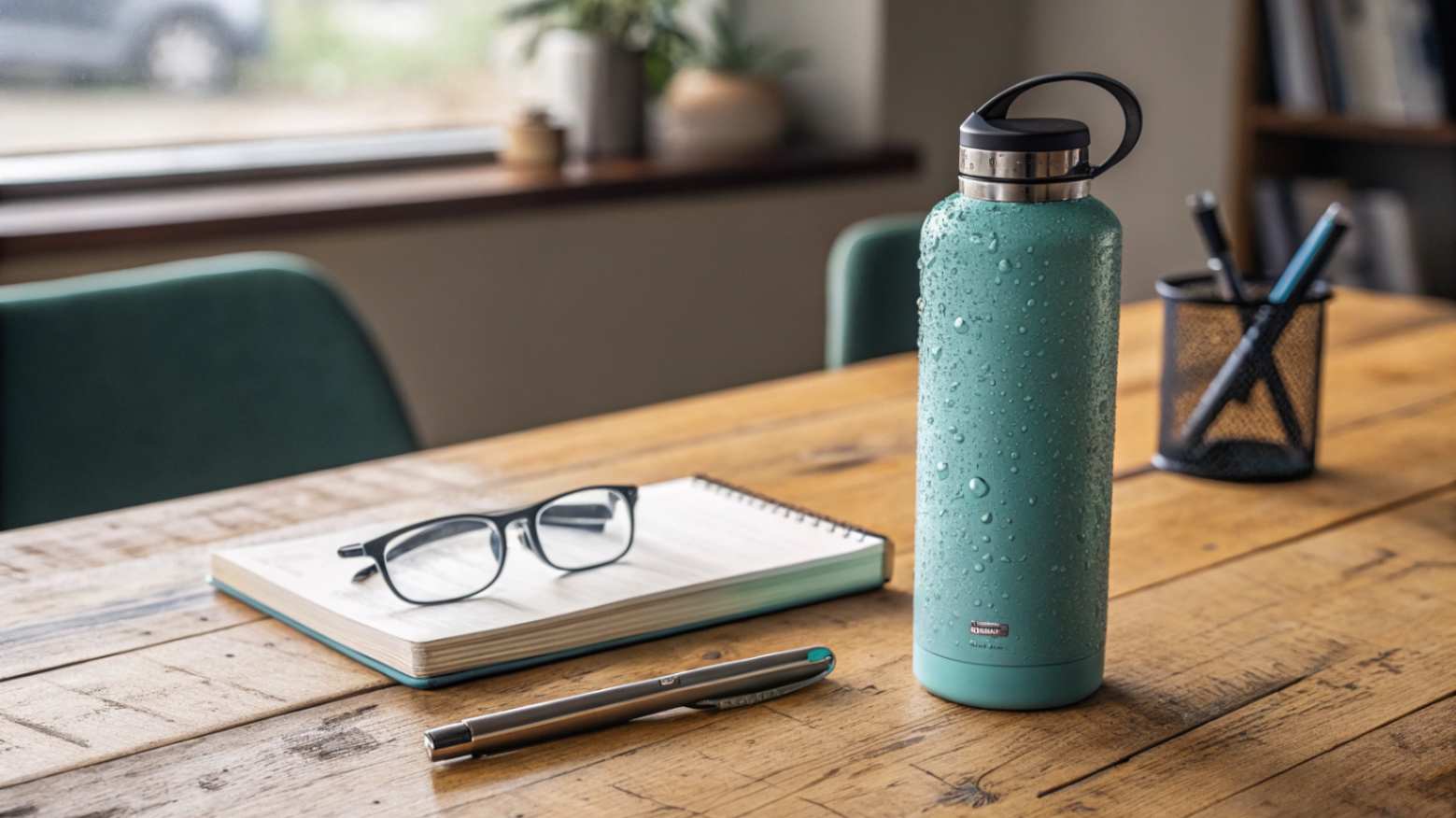
After building relationships with suppliers across Asia, Europe, and North America, I have learned that the best partnerships go far beyond price negotiations. Your supplier becomes an extension of your brand when they produce promotional products bearing your logo.
Essential Certifications and Standards
Quality certifications provide objective evidence of manufacturing capabilities and safety standards. These documents protect both your company and end users from potential liability issues.
Food safety certifications like FDA, LFGB, and REACH ensure materials meet health standards for beverage containers. Environmental certifications demonstrate commitment to sustainable practices. Quality management systems like ISO 9001 indicate consistent production processes.
| Certification Type | Key Standards | Importance Level |
|---|---|---|
| Food Safety | FDA, LFGB, REACH | Critical |
| Environmental | ISO 14001, RoHS | High |
| Quality Management | ISO 9001, BSCI | High |
| Social Compliance | SEDEX, SA8000 | Medium |
Production Capacity and Scalability
Understanding supplier capabilities prevents future problems as your promotional needs grow. A supplier that struggles with a 1,000-unit order will not be able to handle 10,000 units next year.
At Cupique, our 30,000 square meter facility with two production lines can handle orders from 500 to 50,000+ units. But capacity is not just about space – it includes skilled workers, quality control systems, and supply chain management. Small suppliers might offer lower prices but lack the infrastructure for consistent quality at scale.
Communication and Project Management
Clear communication throughout the production process prevents costly mistakes and delays. Your supplier should provide regular updates, proactive problem-solving, and detailed documentation.
The best suppliers assign dedicated project managers for corporate accounts. They understand that promotional products have strict deadlines tied to events, conferences, or product launches. Missing a deadline can derail entire marketing campaigns.
A reliable eco-friendly water bottle supplier demonstrates sustainable production and quality control.True
The section states that a reliable supplier should demonstrate sustainable practices and quality control.
Supplier selection has no impact on brand reputation.False
The section states that the wrong supplier choice can negatively impact a brand's reputation.
Conclusion
Ceramic-coated stainless steel bottles offer superior taste neutrality, premium brand positioning, and long-term durability that maximizes your promotional investment ROI.







